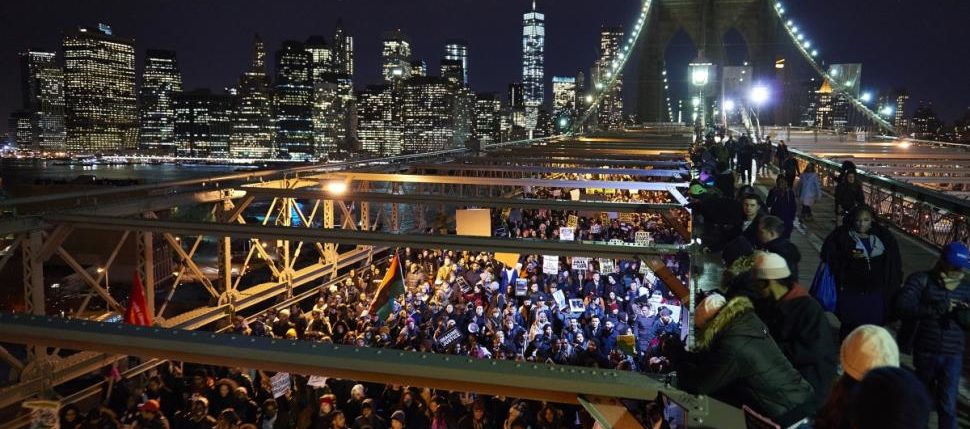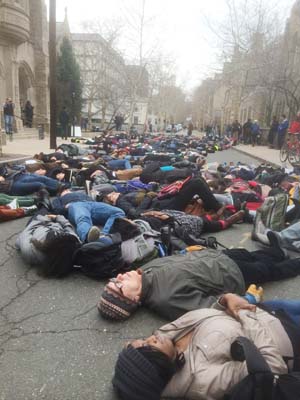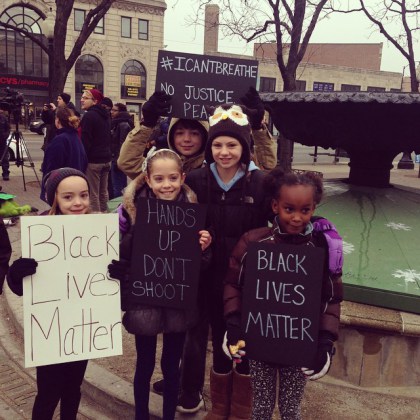
No New Friends (Who Aren’t Allies)
It’s been less than a week since a Staten Island Grand Jury revealed their decision not to indict police officer Daniel Pantaleo for the illegal chokehold that resulted in the death of Eric Garner, and only a few weeks since we heard the verdict in the case against Darren Wilson, another police officer who shot unarmed teenager Mike Brown in Ferguson, Missouri. Since then, peaceful protests have erupted throughout the nation, from mass “die ins” at college campuses and in shopping malls on Black Friday, to shutting down traffic on New York City’s Brooklyn Bridge. Professional athletes have shown their support by warming up in t-shirts that proclaim, “I can’t breathe,” which were captured on video as Eric Garner’s last words. Numerous public figures have denounced the decision, and New York City mayor Bill DeBlasio has personally overseen the new training procedures for NYPD, which not only discourage the use of force, but also seek to improve the way officers communicate with civilians. Slowly, but surely, progress is happening.
Despite all of this evidence that suggests growth, one thing has continued to nag at me, and that is the willful silence of some of my friends and acquaintances. It’s shocking to me that so many of them can remain apathetic when these issues occupy my thoughts constantly, and not because I want them to, but because they threaten my, and many of my loved ones, very existence. I don’t have the luxury of forgetting that Black men and women are dying at the hands of law enforcement every 28 hours in this country. For me, for those who look like me, it’s a reality we face every day when we choose to wear slacks over slouchy jeans, or button-ups over hoodies. We can’t ignore it when we’re pulled over by a highway patrolman for a minor traffic infraction and have to take extra precautions to make sure none of our movements are interpreted as covert. Even while doing so, we know that we can remain still as a statue and still have our lives stolen from us for no reason.
I cannot erase these thoughts from the daily scroll of my mind, not when they are my only flimsy assurance of continued survival.
I don’t expect (although maybe I should) for these issues to be as pressing for my peers as they are for me. What I do expect is acknowledgment and support from those who claim to care about me, who regard me as a friend.
In the End, we will remember not the words of our enemies, but the silence of our friends.
– Dr. Martin Luther King, Jr.
I want to give people the benefit of the doubt. I want to believe that the reason they haven’t reached out is because they simply don’t know. They don’t understand the anxiety that follows each non-indictment verdict, the worry I feel for myself, and my brothers, one of whom lives in Texas (Need I say more?). They don’t understand the invalidation and insecurity these verdicts breed, as it’s demonstrated over and over again how little our nation values Black lives. They don’t understand that there are children witnessing these atrocities who are now terrified to leave the house, distrustful of law enforcement, and incapable of feeling true comfort and security in their surroundings. If they understood, how could they remain silent?
While apathy may be an excuse for some, I think that for many of my friends who I cannot yet call allies, the problem is unfamiliarity with the procedure. Maybe they fear that I view them as complicit or as some sort of enemy, and don’t know how to reach out. Maybe they’re worried about political correctness or saying the wrong thing. Maybe they’ve been listening to one side of the story and are unaware of how these events have impacted me. In my experience, I’ve found that inaction is usually a result of fear.
Well fear no longer, future allies, for I’ve created a brief overview on how to be an ally and I’ll bet it’s a lot easier than you would’ve thought. Plus, you get to remain friends with me, which has its own assortment of perks and benefits.
Show and/or offer support.
This can be demonstrated in a variety of ways. The tried-and-true, and somewhat old fashioned, method would be to call your pal up and let them know that you’re available and willing to listen. Hate chatting on the phone? You can also do this via text, Facebook message, or hell, even Twitter. Just get in touch. They might want to gripe, rant, debate, or possibly just hang out and listen to music or watch a distracting movie, but the most important thing is that you’re available when they do.
You can also show support by staying current with the events that are affecting your friend(s), and you’ll get a gold star if you go so far as to denounce, or at the very least confront, your friends that might be a bit backward in their thinking and inadvertently contributing to the problem. I prefer to just delete and move on, but some feel it their duty to attempt to educate. Perhaps you’re not the outwardly demonstrative type? That’s what petitions are for. There are a plethora in circulation that address these very issues. There are also fundraising campaigns to assist the families of the victims. Both options allow you a more discreet way of showing support and still letting the world know you give a damn.
Be empathetic.
To be clear, there’s a distinct difference between empathy and pity. Empathy is the ability to understand and share in the feelings of others. It means imagining how you would feel or react in similar circumstances. Pity is a feeling of sorrow and compassion caused by the suffering of others. The problem with pity, however, is that it often comes off as condescending. It also connotes a sort of removed helplessness, absolving one of responsibility or action. Empathy will encourage you to listen, even if you tend to believe Darren Wilson’s side of the story, because you can’t imagine what it would be like to lose a son just days before he was meant to begin college. Empathy will allow you to experience a modicum of the rage and helplessness that would propel one to destroy their own community. So far, it’s what’s been missing from the conversations held between news pundits and politicians who condemn protestors’ actions and praise the law of the land.
I’ll admit, these actions are just the beginning. An ally starter kit, if you will. The thing about showing solidarity and being a true ally is it means making yourself available whenever oppression strikes, which unfortunately for everyone, is constantly. Click here for a more inclusive article on all of the steps required to be a true ally. I’m speaking on it in more personal terms, but the movement needs allies just as much as we do as individuals.
I chose not to specifically call out my White friends on purpose. Yes, many of you have remained willfully oblivious, but you aren’t the only ones. I also have Black friends who assume that everything that needs to be said has already been spoken. I have Latino and Asian and Native friends who, as fellow minorities, might feel that they’re exempt from making a statement. No one is exempt.
As long as the country I live in continues to kill Black citizens without reprimand, I cannot entertain a friend who is not also my ally, who is not willing to listen judgment-free, while I tell my version of events.
Categories: Blog


